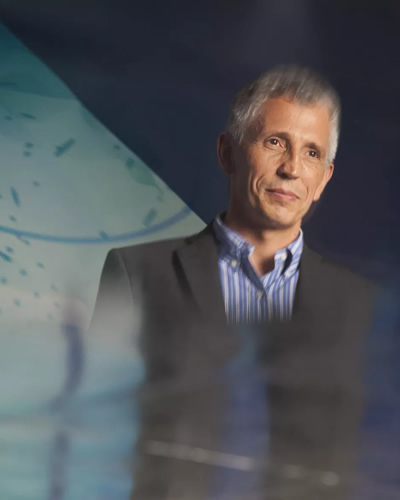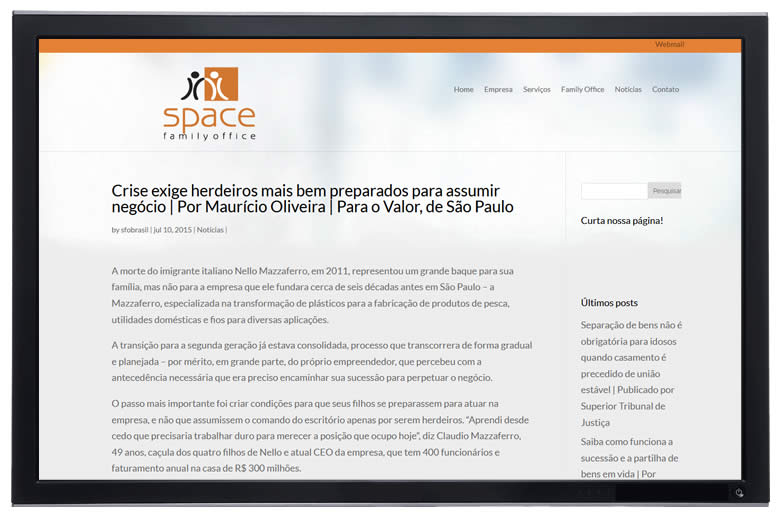Better prepared heirs
Crisis demands heirs better prepared to take over business
(Maurício Oliveira)
The death of Italian immigrant Nello Mazzaferro, in 2011, was a major setback for his family, but not for the company he had founded about six decades earlier in São Paulo – Mazzaferro, specializing in plastic processing for the manufacture of fishing products, housewares and yarns for various applications.
The transition to the second generation was already consolidated, a process that took place gradually and in a planned manner – largely due to the merit of the entrepreneur himself, who realized early enough that it was necessary to guide his succession in order to perpetuate the business.
The most important step was to create conditions for his children to prepare themselves to act in the company, and not to assume the command of the office just because they were heirs. “I learned early on that I would need to work hard to deserve the position I occupy today,” says Claudio Mazzaferro, 49, the youngest of Nello’s four children and current CEO of the company, which has 400 employees and annual revenues of about R$ 300 million.

Claudio graduated in business administration in Italy and has an MBA from Business School São Paulo, as well as courses at Harvard Business School and Booth School of Business in the USA, and Rotman School of Management in Canada. The more specific preparation for understanding the dynamics of a family business came with the courses for board members and corporate governance in family companies at the Brazilian Institute of Corporate Governance (IBGC).
In these courses, Claudio learned the importance of acting based on what he calls “methodological intransigence”. According to him, this means being aware that his mission is to seek the fulfillment of strategies defined jointly by the board of directors and the family council – an instance that has as one of its incumbencies the preparation of the members of the third generation.
“Well-planned transition cases should be the rule, but it is still common to see companies being taken by surprise by the death or illness of the founder”, says consultant Cláudia Tondo, specialized in entrepreneurial families and director of IBGC.
Ana Cláudia Reis, partner-director in Brazil of the executive recruitment consultancy CTPartners, emphasizes that facing a complicated macroeconomic scenario like the current one, competition becomes fiercer in all sectors, and this increases the pressure on family companies. “In many cases, the founders are so involved in the day-to-day running of the business that they are unable to think long-term,” he says.
There are also those who are reluctant to transfer control or management to the heirs with the illusion that they are eternal – and only begin to change their minds after experiencing an extreme situation. “I had a client who only decided to move after he suffered an express kidnapping and realized that everything in the company and in the family depended on him”, exemplifies Cláudia Tondo, from IBGC.
Ana Cláudia Reis, partner-director in Brazil of the executive recruitment consultancy CTPartners, emphasizes that in a complicated macroeconomic scenario such as the current one, competition becomes fiercer in all sectors, and this increases the pressure on family businesses. “In many cases, the founders are so involved in the day-to-day running of the business that they are unable to think long-term,” he says.
There are also those who are reluctant to transfer control or management to the heirs with the illusion that they are eternal – and only begin to change their minds after experiencing an extreme situation. “I had a client who only decided to move after he suffered an express kidnapping and realized that everything in the company and in the family depended on him”, exemplifies Cláudia Tondo, from IBGC.
Not every heir has this vocation and is prepared to assume a position in the family business, but many who meet these requirements see the transition of generations as a true life mission: to carry on the work left by the ancestors. Despite the almost sacred connotation that work acquires in these circumstances, every heir ends up facing, sooner or later, the dilemma between continuing in the family business or pursuing a solo career.
“It takes a lot of persistence and emotional intelligence to resist the temptation to leave,” says Claudio Mazzaferro. It is enough to see him talk about the plans in front of the company founded by his father, however, to realize how much he likes what he does and is motivated by the prospects for expansion. “In my case, pride and identification with a 63-year business history also prevails.”
One measure that can help withstand the pressure and see paths in the midst of such a complex journey is to count on the accompaniment of a coach – in Claudio’s case, this work has been carried out for ten years by Herbert Steinberg, from Mesa Corporate Governance.
Consultant Renata Bernhoeft understands well the dilemmas experienced by many of her clients. She even tried to escape the fate of following the steps of her father, Renato Bernhoeft, a consultant specialized precisely in the area of succession. He worked in hotel management, owned a restaurant, and a snack bar franchise. One day, he helped his father in a project, liked it, and “stayed”. From then on, he got an executive MBA and a post-graduate degree in family therapy.
Today, at the age of 44, he is the head of höft, the consulting company that gives continuity to Bernhoeft, founded by his father in 1975. “I realized that my mission is to unite these two universes: company and family”, defines Renata. Curiously, this same vocation presented itself in her personal life. Her partner, Wagner Teixeira, who joined the consulting firm in 1999 as a non-family executive, became her husband in 2005.
According to Renata, one of the biggest challenges in a generational transition process is to “create fiber” in those who are arriving. “The company needs people who are really dedicated and can’t become a hanger of jobs. Otherwise, it will be doomed to disappear”, she says.

Published in Valor Econômico newspaper on June 25th, 2015 and SFO Brasil website on July 10th, 2015:
valor.globo.com/carreira/recursos-humanos/noticia/2015/06/25/crise-exige-herdeiros-mais-bem-preparados-para-assumir-negocio.ghtml
sfobrasil.com.br/crise-exige-herdeiros-mais-bem-preparados-para-assumir-negocio-por-mauricio-oliveira-para-o-valor-de-sao-paulo


